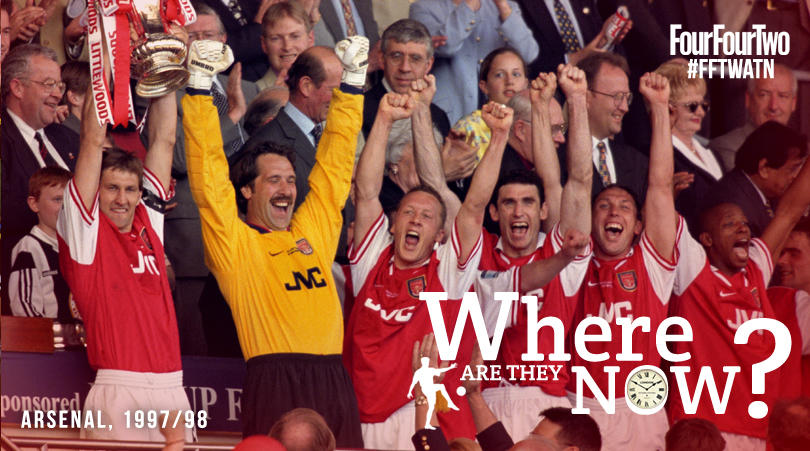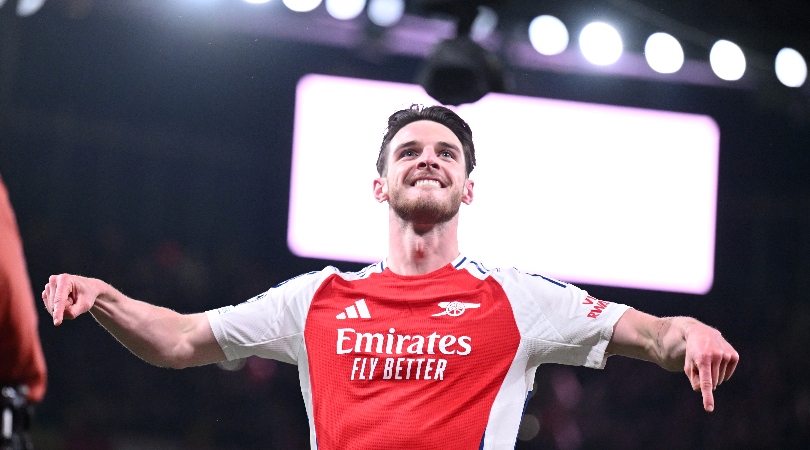The 10 best Arsenal players of the Premier League era
The greatest Gunners to have plied their trade at Highbury or the Emirates since 1992
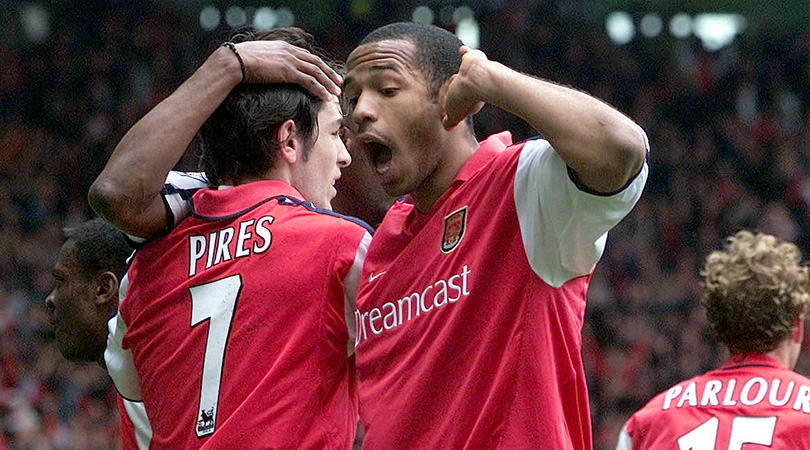
Arsenal’s Premier League life can be broken into three distinct eras: the early-to-mid 1990s, the rise towards Invincible supremacy and the stasis of the past decade.
Any list of great players since 1992 has to account for those differences and reward both a more literal type of value and relevance on the road to success...
10. Paul Merson
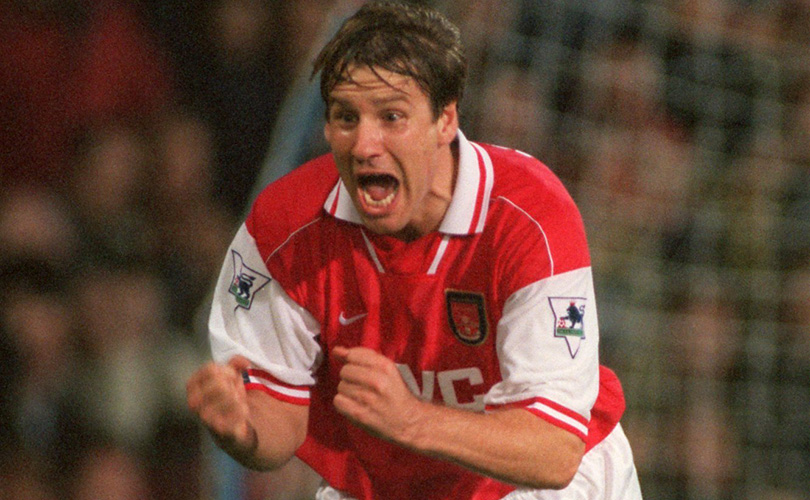
In one sense, it's good that Merson has found a second career in the media: his personal difficulties drained his wealth over the years and post-football life was never likely to be easy. His adopted television personality has allowed him to become a figure of fun, however, especially among those who are too young to have seen him play. Rather than his chip at Stamford Bridge or his snaking run-and-finish at Anfield, search engines results for Merson are filled with zany comments and grammatical faux-pas.
But crikey, he could play. And, though subsequent years have eroded that perception, he was an exceptionally smart footballer. His best Arsenal moments probably came before the Premier League began, and certainly before his personal life was griped by vice, but he still flashed with periodic excellence in the early-to-mid '90s and was as synonymous with the Gunners as almost any other player.
Merson was a victim of football's growing popularity and the fame it afforded him. His own weaknesses may have made him more susceptible to those dangers, but that was a time before awareness existed for such threats. Rather than mourning what he might have been, though, perhaps it's better to celebrate what he was still able to be in spite of such difficulties.
9. Ray Parlour
Get FourFourTwo Newsletter
The best features, fun and footballing quizzes, straight to your inbox every week.
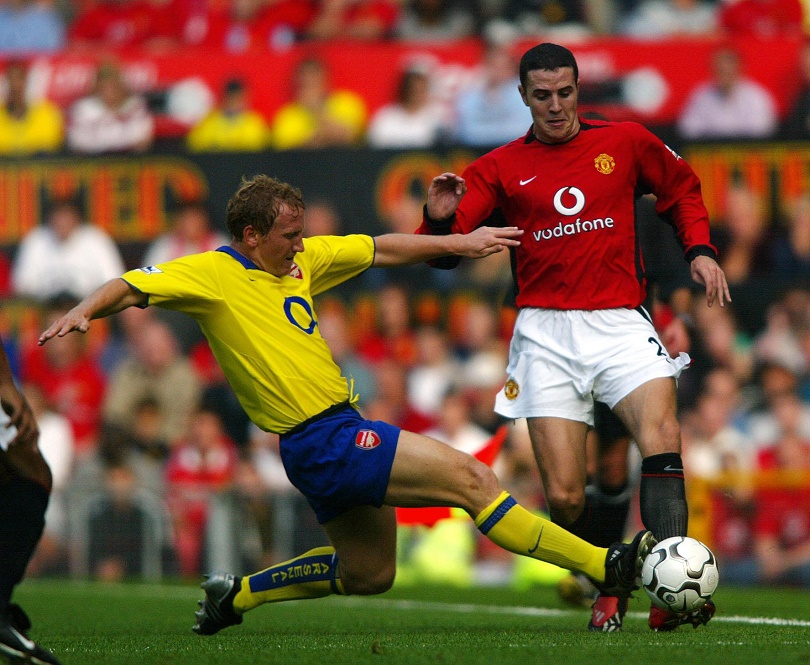
If anyone should have been a victim of Arsene Wenger's arrival at Arsenal, it was Parlour. A charter member of the hard-living culture which existed at the club in the 1990s, he was exactly the sort of English professional that Wenger was destined to purge.
Instead, the player once described by Gilles Grimandi as "the funniest he had ever trained with" - presumably not because of his rigid belief in the merits of conditioning - was reborn. He would win four Premier League titles under Wenger as his Arsenal career continued well into the new century. He was no bit part, either, rather an important part of the attacking structure who also provided a bridge between different eras.
When Wenger reformatted his attack around more modern principles, Parlour responded by tailoring his game and would eventually become the lone original. He evolved into a different type of footballing asset and was arguably the hardest-working member of that generation, while he also provided an important cultural anchor to the club's identity.
His 333 Premier League appearances for the Gunners may never be surpassed.
8. Alexis Sanchez
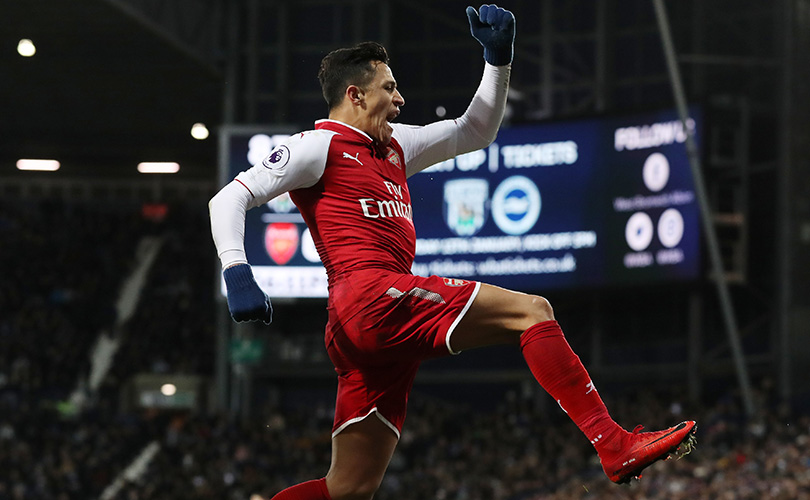
The road between Highbury and the Emirates was rocky and tough to endure for supporters who had to watch newly-monied rivals grow beyond them. Sanchez eventually represent the reward, though, because he was the type of elite player envisaged throughout that austerity. It was short-term sacrifice for an eventual pay-off: suffer through the Gervinhos and Chamakhs and, one day, it will all be worthwhile.
Before his January 2018 swap with Henrikh Mkhitaryan, Sanchez was a rarity; a decadently gifted player with a suitcase full of pyrotechnics, but also one equipped with the kind of blue-collared grind that allows his quality to flourish in an attritional environment.
By the time of his departure he'd scored 80 goals in 166 appearances for the Gunners, and won a pair of FA Cups – where he scored in each semi-final and final – to show for it. Sanchez was never going to drag his team to Premier League greatness on his own, though, and there was a dissatisfying conclusion to his four-year stint in north London. Still: his travails at Old Trafford prove the Gunners probably got rid at the right time.
7. Martin Keown
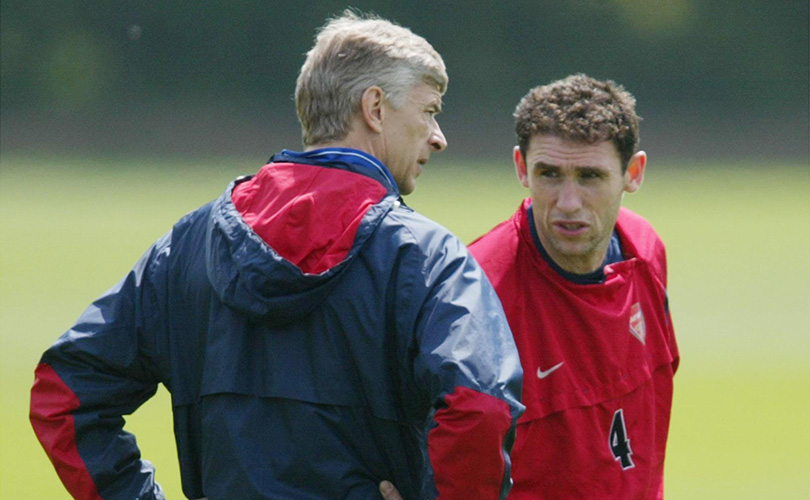
An absolutely horrible player, albeit in the way he needed to be.
"Martin and I then had a row over football issues. I must have said something he took offence at and he pushed me over, kicked me in the face and split my eye."
That anecdote, from Simon Hart's Here we go: Everton in the 1980s - as told by Pat Nevin - offers a better description of Keown than his encounter with Ruud van Nisteelroy ever will. He was a rugged, uncompromising figure who would eventually become part of the iron first in Arsenal's velvet glove. But he was also smart enough to survive the apocalypse and his professional career spanned over 20 years because, in addition to his more obdurate qualities, he was one of the finest man-markers the British game has ever seen.
His 310 Premier League appearances place him above every other outfield member of that famed defence. He may have looked like an artist's impression of an antiquated centre-half, but his longevity relied on far more than just simple resilience.
NEXT: "An evergreen symbol of brash, 1990s enthusiasm..."
6. David Seaman
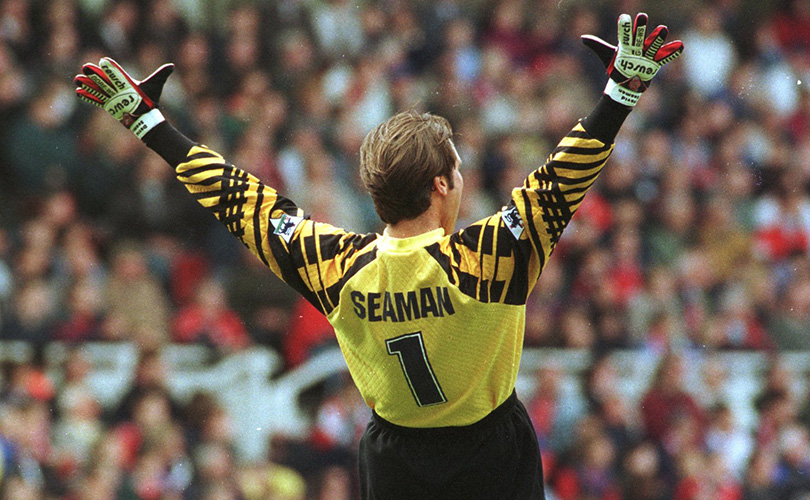
Arsene Wenger was fortunate to inherit a stable defence and that unit is widely considered to have been the foundation for his early success. But if the organisation and understanding that existed between the famous back four deserves recognition, then so too does the continuity provided by the goalkeeper behind them.
Seaman wasn't the best shot-stopper and at no point during his career was he definitively the best goalkeeper in the country, but his understanding for the strengths and weaknesses of the players ahead of him fortified the road block. Neither should it be overlooked that, as the old guard gradually retired and made way for younger players, much of that solidity remained.
Possibly the most descriptive measure of his worth was shown in the trouble Arsenal had in replacing him. Wenger had some success with Jens Lehman, but a succession of custodians - some of them highly talented - lacked the temperament to perform for a club of that size. Lukasz Fabianski's career recovered later, Wojciech Szczezny eventually matured in Serie A and Richard Wright arguably never recovered from botching his lines on that stage. Seaman may sometimes have been depicted as merely part of the furniture, but only after his departure did it become clear how lucky Arsenal were to have had him.
5. Ian Wright
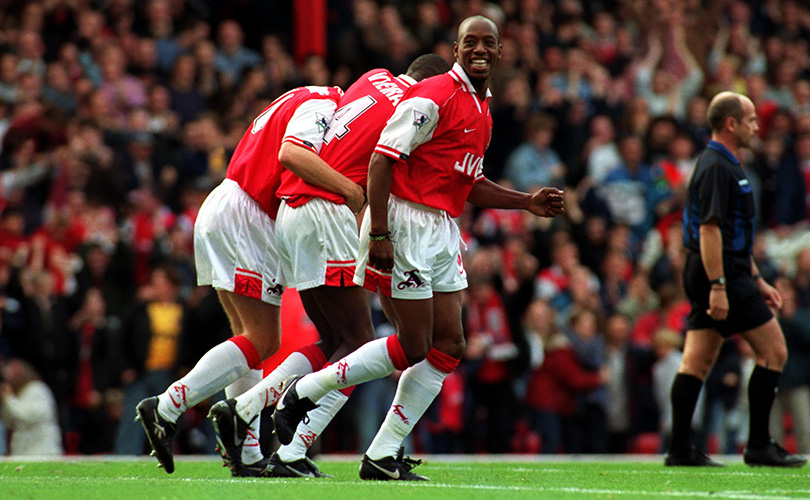
Were you to teach a young child how the game should be played, you could do far worse than show him or her clips from Wright's career. Though his behaviour wasn't always exemplary, his enthusiasm was infectious: he loved playing for Arsenal, he loved scoring goals and, for the duration of his career, he seemed to love living. Contemporary players and their stylised cool are relatively joyless, but Wright, as antagonistic as he was capable of being, always gave the impression of understanding his privilege. He was a bundle of menace, mischief and ability and, whether you loved or hated him, you still couldn’t turn away.
But none of that would matter if he hadn't been the striker he was. Statistics aside, Wright is a difficult player to appreciate in retrospect. Thierry Henry's stratospheric standards made him look comparatively normal and his brand of forward play archaic, but nobody could have survived that juxtaposition; Henry was a different type of athlete altogether.
Within the context of his time, though, Wright was sensational. He was predatory, and to this day remains one of the most reliable one-on-one finishers English football has seen, but he was more than that, too. His goal at Elland Road in October 1995, a floated chip caressed over John Lukic, was evidence of his swaggering finesse, and his swirling left-footed strike against Auxerre in the previous year's Cup Winners' Cup showed the breadth of his range. Regardless of what came next, Wright was an eclectic goalscorer of the highest standard.
A great player, but also a vivid character and committed entertainer. He may no longer hold the club's goalscoring record, but he remains an evergreen symbol of brash, 1990s enthusiasm and early Premier League excellence.
4. Tony Adams
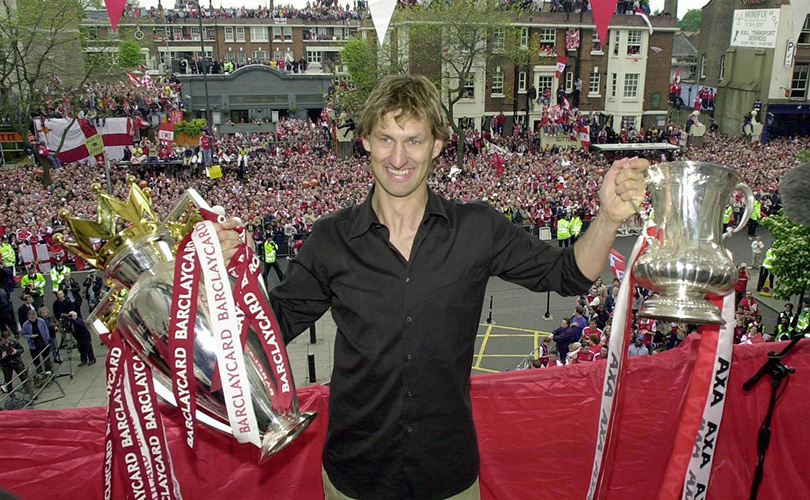
BETWEEN THE LINES Tony Adams' demons: "The sweats, hallucinations, terrors... the voices... this is not normal"
Seventeen years after its publication, Addictive remains a compelling read. Long before it became a fashionable way of escaping consequences, Adams used his autobiography to definitively own his failings as a younger man. His alcohol addiction persisted in spite of a potentially fatal car accident and a jail sentence, with his burgeoning football career surviving only because of his wonderful ability.
He would play his best football after his 30th birthday once his demons had been locked away. Arsene Wenger's emphasis on diet and conditioning probably helped, but Adams' determination to better himself as a person allowed him to become the presence he was. There are few captains in Premier League history who have enjoyed a comparably strong psychological hold over their team-mates, which is testament to the player and person he was. The centre-back was club captain from a young age, but there’s a definite “before” and “after” within that: Adams was always a leader, but he would eventually become an example, too.
His performance for England in Saint Etienne 1998 remains his finest moment, but he was also the masterbrick in a defensive system which belongs in the Premier League's pantheon forever.
NEXT:
3. Patrick Vieira
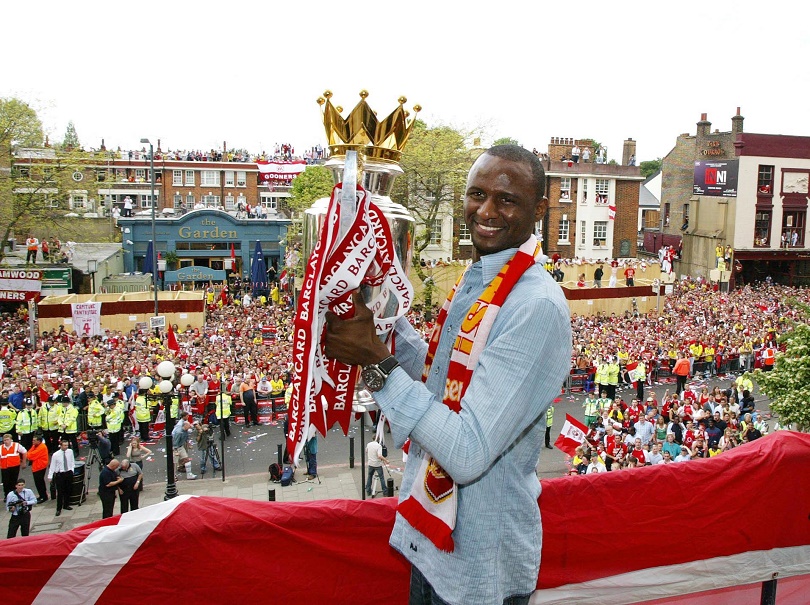
In time, the hope should be that memories of Vieira are more than just anecdotal and that his footballing worth is allowed to transcend that clip of him and Roy Keane in the Highbury tunnel. Yes, he was intimidating and Vieira unquestionably had a fierce bite. But while it's entirely appropriate to celebrate that sharp edge and to recognise that he occasionally strayed beyond the rules, his legacy remains relatively pure.
Irrespective of era, all great midfielders are judged not only on what they themselves were able to do, but also on what they allowed others to achieve. The measure of Vieira, then, is not in those sequences when he strode through the middle of the pitch, skittling opponents like bowling pins, nor could it be glimpsed when watching him reduce veteran opponents to helpless children. Instead, the true value of Vieira lies in the reverence with which his contemporaries described him.
Talk to every Arsenal player from the Invincibles era, from goalkeeper to centre-forward, and they will not only tell you that he was their most important part, but will also reveal a different layer of influence that you never knew he had. Together, they were a marvellous team, but without the Frenchman they might not still be talked about today.
2. Dennis Bergkamp
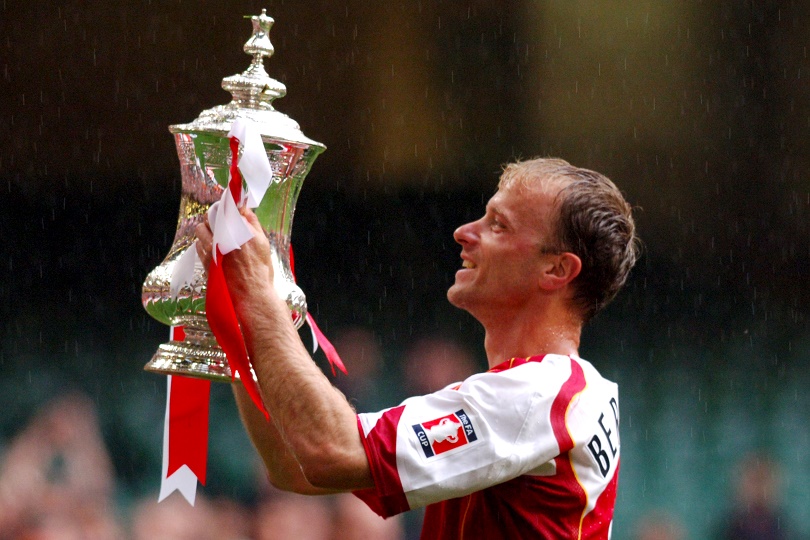
It's tempting just to reel off a list of career highlights and reference the goals of his which still remain on heavy rotation. Bergkamp, though, is most vividly portrayed through the words of his team-mates and rivals.
Paul Merson once said that he "honestly didn't think a professional player could be that good" and Peter Schmeichel suggested that the Dutchman “played football like it was all a dream – you couldn’t even imagine some of the things that he was capable of doing with a football". Novelist Nick Hornby once wondered aloud whether the Dutchman "had three feet".
More tellingly, Arsene Wenger - and others - often referenced his professionalism. Bergkamp’s individual gifts may have been bestowed from above, but he was also a shining example to other players: when he arrived from Inter in 1995, his standards of preparation were already in line with the most evolved thinking of the time.
Consider, then, the value of Bergkamp the Evangelist. Arsenal's dressing room was not without talent in the mid-90s, but the club's ascension relied on more than just expensive recruitment and a different tactical approach. Wenger is rightly credited as that movement's architect, but it would be disingenuous to deny Bergkamp's own impact. “If you do that, you can play like this”; that’s powerful stuff.
The goals are the shiny gloss on his career, but that influence is the bedrock of his legacy.
SEE ALSO Dennis Bergkamp, as told by Nigel Winterburn
1. Thierry Henry

How many times has a player made the Premier League his own playground? Cristiano Ronaldo didn't, Eric Cantona didn't. That level of dominance occurs once in a generation and, over his 258 Arsenal league appearances, that's exactly what Henry managed.
He made football look easy. Not in the casual sense and not in isolated patches, but in whole games, weeks and months. He was quicker than everybody else, he was the most reliable finisher in the country and, often, he expressed himself in ways which wouldn't even occur to other players.
His famous goal against Manchester United, the volley manufactured from his own flick, was the clearest example of what separated from his peers: his conviction in his own ability was so total that it occasionally allowed him to be undefendable. What that, along with dozens of other examples, also evidenced was that for all his physical advantages, Henry had an innate ability to identify opportunity within games. He saw angles, he exploited goalkeepers' positions and he possessed a reflexive ability to drive towards an opponent's weaknesses. Combined with his execution, that made him unstoppable.
He's the quintessential Arsenal player of his generation. The club's modern football traditions are all based on the qualities he embodied: style, beauty and success. Rarely does such formidable power present itself in such elegant form and, through both the aesthetic he created and the goals he scored, he was able to hit the centrepoint between those ideals.
NOW READ...
RANKED! The 20 greatest Premier League sides by points total
Subscribe to FourFourTwo today! 6 issues for £19
Seb Stafford-Bloor is a football writer at Tifo Football and member of the Football Writers' Association. He was formerly a regularly columnist for the FourFourTwo website, covering all aspects of the game, including tactical analysis, reaction pieces, longer-term trends and critiquing the increasingly shady business of football's financial side and authorities' decision-making.
